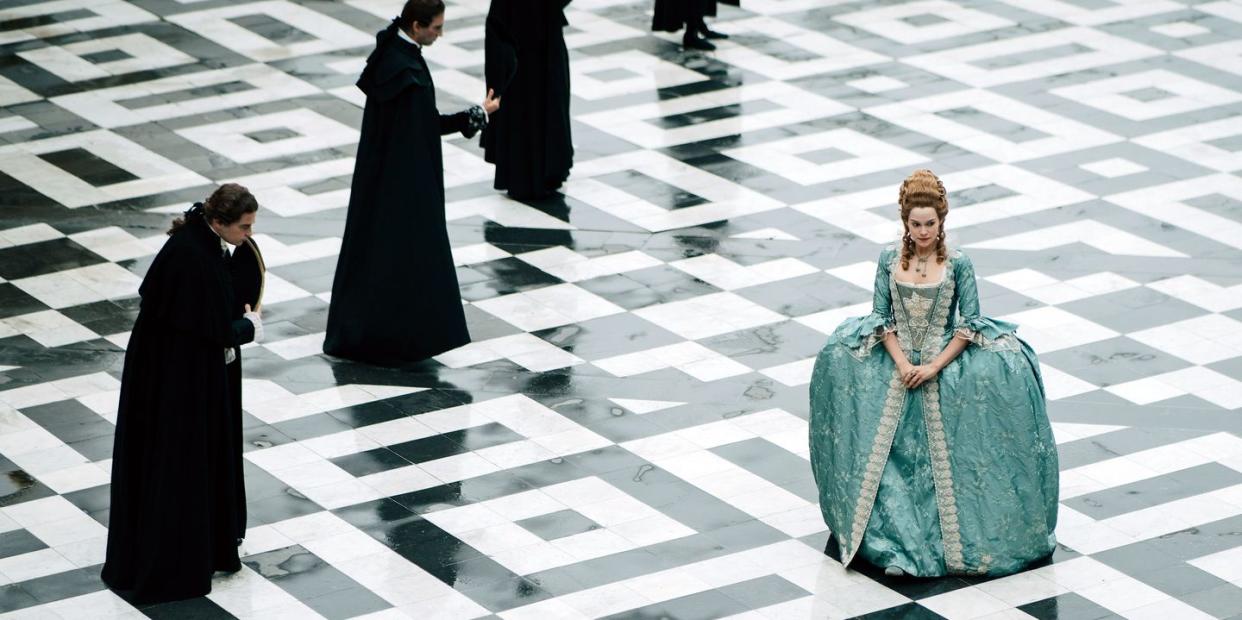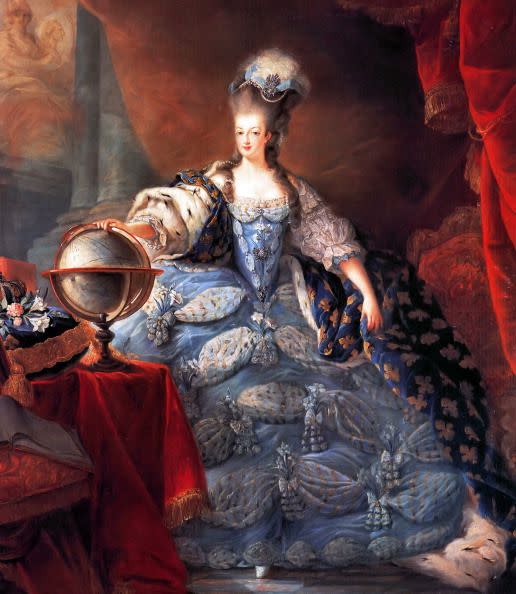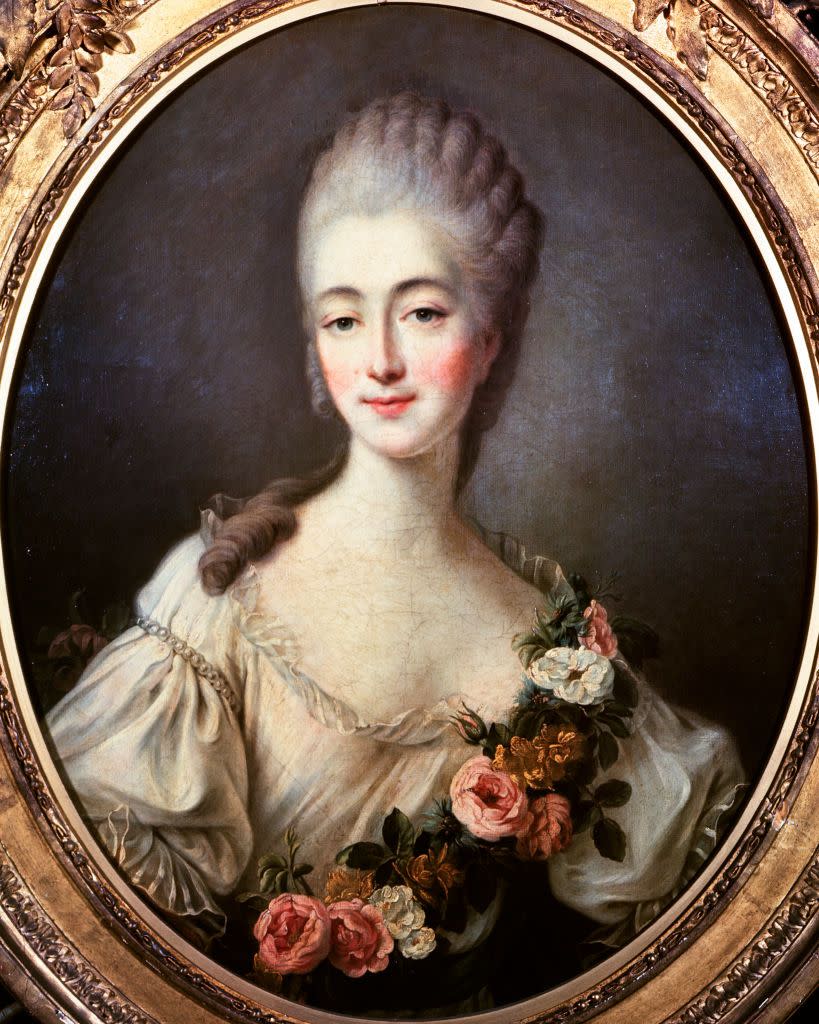“Marie Antoinette” Portrays the Queen as a Feminist Icon. Here’s Why Some Historians Disagree.

- Oops!Something went wrong.Please try again later.
"Hearst Magazines and Yahoo may earn commission or revenue on some items through these links."
More than two centuries after her notorious beheading, Marie Antoinette has continued to capture the imaginations of modern audiences. Her life and infamous extravagance has been the subject of multiple adaptations, including Norma Shearer’s Oscar-nominated portrayal in 1938 and Kirsten Dunst’s performance in Sophia Coppola’s polarizing 2006 historical drama.
The latest retelling is Marie Antoinette, a new television series produced by the BBC and Canal+. The historical drama made its stateside debut on March 19 on PBS, but its first season already aired in the United Kingdom last year. The show has been renewed for a second season.
The series seeks to portray Marie Antoinette as a feminist icon, according to members of the cast and crew. Emilia Schüle, who portrays the title monarch, called her a “rebel” who was “modern, emancipated, and fought for equality and for her personal freedom.”
But some critics and historians have bristled at this more modern view of the legendary queen. Melanie Clegg, author of Marie Antoinette: An Intimate History, said she “absolutely wouldn’t have regarded herself” as a feminist, and the French newspaper Le Figaro found the portrayal so offensive, it cheekily suggested British and American filmmakers “should be banned from Versailles.”
In a statement to Biography.com, Marie Antionette executive producer Claude Chelli defended the show’s portrayal. Chelli noted that, having been born to a more relaxed Austrian court, many of her actions were more independent than would be expected from a woman of her position in France. For example, he said, she brought property under her own name, built her own personal life away from Versailles, wished to keep her children close to her, and made political decisions when the king was unable to decide.
“Of course, all of these actions could not be called feminist,” Chelli told Biography.com. “We’re all aware that ‘feminism’ is a modern concept, and Marie Antoinette’s actions were not abiding by any theoretical corpus, but what she did was conducted by self-awareness and free will, which is very modern and could be assimilated to feminism.”
A More Modern Marie Antoinette

The first season of the new series covers Marie Antionette’s teenage years in the 1770s, when she first departed Austria and arrived in France to marry Louis XVI, the future king. She must navigate the complex social politics of the French court while winning the affection of her future husband, portrayed by Louis Cunningham as an almost cripplingly shy dauphin of France.
Series creator and co-writer Deborah Davis, who won a BAFTA for her script for the Olivia Colman film The Favourite (2018), sought to bring a more modern perspective to Marie Antionette, who she said came from a long line of strong-willed, spirited women. “I found the fighter, and I loved being with her all the way through her battles,” she told Variety.
Pete Travis, who directed the first four episodes, said he particularly admired the show’s feminist take, telling Variety: “History films are usually about men, and in [this series] men make the world, but it’s the women who have the strongest will, and that’s what makes it contemporary.”
Schüle, who read many books about Marie Antionette to try to understand her character, called her a deeply misunderstood woman. She was particularly disappointed with Sofia Coppola’s 2006 film, which she said only “stays on the surface” and ignored the challenges Antoinette faced in favor of an oversimplified image of a luxury addict.
“I do think that there is a very wrong image out there about her. She’s so much more complex than what people think,” Schüle told The New York Post. “That’s something we’re really getting into on our show.”
Playing Fast and Loose With History

Not everyone is thrilled with the show’s portrayal of its iconic title character. While acknowledging that every biopic takes liberties with the truth, several historians have contended that Marie Antionette strays too far from reality in its attempt to cast its heroine as a feminist hero.
Blaise De Chabalier, culture writer with Le Figaro, is among the most critical voices, accusing the show of turning her into “a feminist activist before her time.” He wrote that the series “insults the queen” and presents “an avalanche of scenes that are often vulgar, totally out of context, and sometimes plain obscene.”
Biographer Évelyne Lever likewise called the show a “grotesque caricature” and a “litany of historic aberrations.” She told The Telegraph that Marie Antoinette believed in the divine right of kings and would not act like a “militant feminist,” adding: “As a historian, I am embarrassed that viewers believe that this series accurately reflects the times.”
Catriona Seth, a historian and literary scholar at the University of Oxford, called the feminist label “anachronistic” and told the Smithsonian Magazine it “doesn’t correspond to [Marie Antoinette’s] way of viewing things at all.”
Lever’s strongest criticism was not actually for Marie Antoinette’s portrayal but for scenes involving Madame du Barry, the royal mistress of King Louis XV. In the series, she sits on the king’s lap during family meals and acts outwardly promiscuous. Despite her role as the royal maîtresse-en-titre, Lever told The Telegraph she would never have behaved this way.
Seth criticized the show’s inclusion of a kissing scene involving Marie Antoinette and Madame du Barry, which Seth said were inspired by centuries-old libelous texts written about the queen’s alleged sexuality and promiscuity to defame her prior to her 1793 execution.
Marie Antoinette has always been a controversial historical figure, with a legacy that has been hotly debated for more than 200 years. That controversy has tended to extend to her portrayals in pop culture as well, and the new series is no exception. As Emine Saner wrote in The Guardian, “the trend for reappraising historical and maligned female figures with a contemporary viewpoint is unstoppable, and anyway, this is not the first revision of the last queen of France before the revolution.”
How to Watch Marie Antoinette
The first episode of Marie Antoinette is streaming now on PBS.com. New episodes will air on PBS each Sunday at 10 p.m. ET through May 7.

